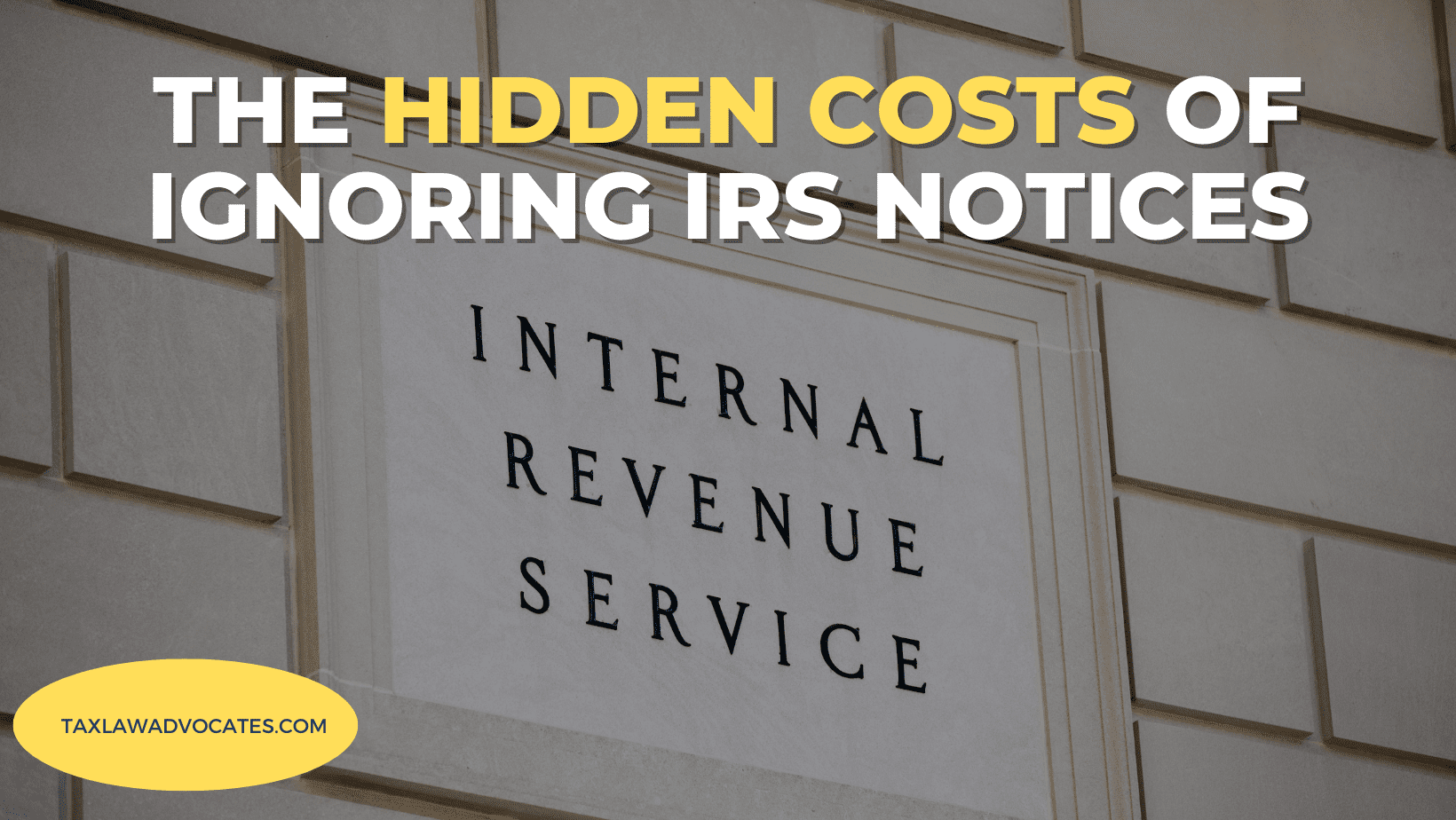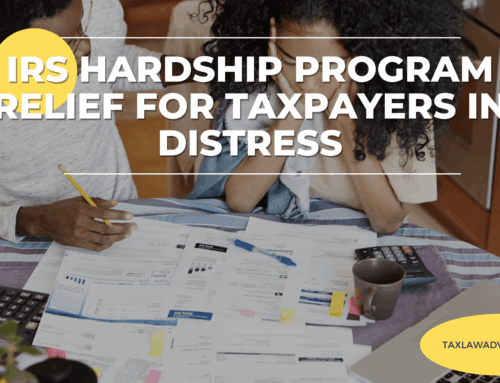It’s often said that what you don’t know can’t hurt you. Unfortunately, when it comes to the IRS, ignorance or intentional avoidance is not bliss—it can come at a steep price. Every year, millions of taxpayers receive some form of notice from the IRS. These notices can range from a simple request for additional documentation to a more serious warning about impending collection actions. Yet, despite the potential gravity of these communications, many people ignore them, hoping the problem will vanish on its own.
This approach is misguided. Failing to respond promptly to IRS notices can lead to a host of escalating problems. Increased penalties, mounting interest, and eventually liens, levies, and wage garnishments can turn a manageable tax issue into a full-blown financial crisis. Understanding why the IRS sends these notices, the types of notices you might encounter, and the immediate steps to take upon receiving one is essential. Timely action not only protects your finances but also preserves your peace of mind.
Why the IRS Sends Notices
The IRS doesn’t send notices arbitrarily. Each notice serves a specific purpose, whether it’s requesting clarification, notifying you of a balance due, or alerting you to discrepancies in your tax return. Here are some common reasons why the IRS may reach out:
- Balance Due: If you underreported income or failed to pay the full amount owed by the tax deadline, the IRS will send a notice indicating how much you owe and the timeline for payment.
- Unfiled Returns: The IRS may inform you that it has no record of a required tax return. If you missed a filing deadline or thought you could skip a year’s return, the IRS will eventually catch on.
- Mathematical Errors: Sometimes the notice is as simple as flagging arithmetic mistakes in your return. The IRS might correct the error and let you know how it affects your refund or tax due.
- Requests for Documentation: The IRS may want more information to verify claims on your return, such as credits or deductions. They will specify what they need and give you a deadline to provide it.
- Audit Notices: Receiving a letter requesting an audit doesn’t mean you did something wrong, but it does mean the IRS wants a deeper look into certain items on your return.
Types of IRS Notices and What They Mean
IRS notices have unique letter and number codes. Some of the more common types include:
- CP14 (Balance Due Notice): This is the most common notice taxpayers encounter, stating that you owe money. Ignoring it can quickly lead to penalty and interest accumulation.
- CP2000 (Underreported Income): This notice arises when the income reported on your return doesn’t match what was reported to the IRS by third parties (e.g., employers, banks). Ignoring a CP2000 means you might face increased assessments and penalties.
- Letter 566 (Documentation Request): The IRS might need supporting documents for your claimed deductions or credits. Failure to respond can lead to the denial of those tax benefits and additional taxes owed.
- Letter 2205 (Audit Initiation): This notifies you that your return is being examined in detail. Not cooperating can lead to adjustments that are rarely in your favor, plus penalties for failure to comply.
The Risks of Ignoring IRS Notices
People often ignore these notices out of fear, misunderstanding, or simple procrastination. Common reasons include:
- Denial or Overwhelm: Tax issues can be stressful, and it’s tempting to hope the problem resolves itself. Unfortunately, the IRS does not forget; the more time passes, the more severe the consequences.
- Unawareness of Rights and Options: Some believe that if they acknowledge the notice, they are admitting fault. In reality, responding promptly can help preserve your rights and explore solutions.
- Misplaced Priorities: With busy lives, a tax notice might not seem urgent. But pushing it aside can transform a small issue into a large one.
Consequences of Ignoring IRS Notices
Failing to respond sets off a chain reaction that’s both costly and stressful:
- Increased Penalties and Interest: The longer you delay, the more interest accumulates on any unpaid tax. Additionally, you’ll likely incur failure-to-file or failure-to-pay penalties. Even a relatively small initial balance can balloon into a significant financial burden.
- Liens and Levies: The IRS can file a Notice of Federal Tax Lien against your property. This lien can damage your credit and limit your ability to sell assets. If the situation worsens, the IRS may levy your bank accounts, garnish your wages, or even seize property to satisfy the debt.
- Wage Garnishments: The IRS doesn’t need a court order to garnish your wages. Once initiated, wage garnishments can persist until the tax debt is fully satisfied, putting you in a difficult financial position.
- Loss of Refunds: If you have future refunds coming your way, the IRS may apply them toward your outstanding balance, leaving you without that expected financial relief.
- Legal Complications and Audits: Ignoring notices, especially those related to compliance, can prompt the IRS to audit you more thoroughly. An audit without adequate preparation and communication can result in unfavorable outcomes and even criminal consequences for willful neglect.
Immediate Steps to Take After Receiving an IRS Notice
- Open the Notice: Don’t let fear stop you from reading the notice thoroughly. Knowing what it states is the first step to resolving the issue.
- Note the Deadline: IRS notices usually include a response timeframe. Mark this date on your calendar. Timely action can spare you additional penalties and complications.
- Gather Information: Collect all relevant tax returns, receipts, and financial records. If the notice involves payroll taxes (for business owners) or complex deductions, ensure you have comprehensive records at your fingertips.
- Contact a Tax Professional: Dealing with the IRS is often complicated. Working with a seasoned professional can help you navigate the process efficiently. Tax Law Advocates, for example, employs federally-licensed enrolled agents, tax attorneys, and accountants who regularly deal with both IRS and state authorities. They can assess your situation, advise you on the best course of action, and even represent you in negotiations with the IRS.
- Respond in Writing and Send Documents Securely: If the IRS requests documentation or an explanation, respond formally and keep proof of your submission. Send copies (never originals) and use certified mail or an approved electronic channel.
- Consider Payment Plans or Other Relief Options: If the notice indicates you owe money and you can’t pay in full, explore IRS payment plans or other relief programs. Under the IRS Fresh Start initiative, there are more flexible installment agreements and potentially even offers in compromise to settle for less than you owe. Tax Law Advocates can help you determine eligibility and handle the application process on your behalf.
How Tax Law Advocates Can Help
The stakes are high when dealing with IRS notices. Choosing to ignore them only invites escalating penalties, mounting interest, and severe collection actions. By contrast, engaging experienced professionals can make all the difference.
At Tax Law Advocates, we understand how daunting IRS correspondence can be. Our team’s extensive experience, which includes federally-licensed enrolled agents, tax attorneys, and accountants, ensures you receive personalized solutions. We’ll:
- Analyze your financial and tax situation
- Develop a tailored plan to address the notice
- Represent you in discussions with the IRS
- Help negotiate payment plans, settlements, or other relief measures
Our goal is to minimize the financial damage and reduce the stress associated with IRS issues, whether you’re dealing with personal income tax discrepancies, business-related payroll tax problems, or more complex issues.
Take Action Now: Protect Your Future
The costs of ignoring IRS notices aren’t just financial. The stress, uncertainty, and long-term damage to your financial health can be significant. Don’t let fear or confusion prevent you from taking action.
If you’ve received an IRS notice or suspect you might have tax complications on the horizon, now is the time to act. Contact Tax Law Advocates at 855-612-7777 or visit taxlawadvocates.com today. Let our team guide you toward a resolution that protects your finances, your peace of mind, and your future. By taking prompt action, you can transform a potentially overwhelming challenge into a manageable opportunity for compliance and relief.






